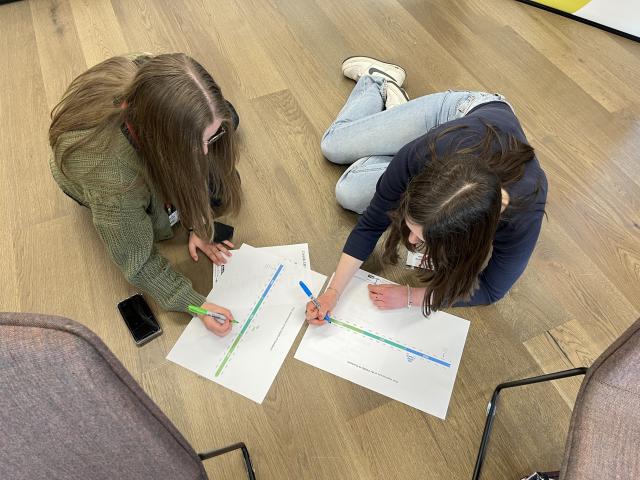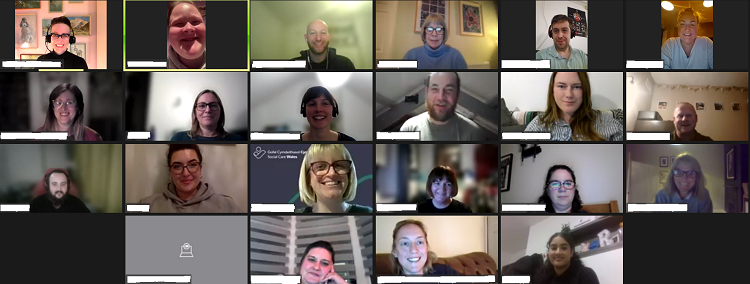
Top 10 research priorities identified for care experienced young people with unmet emotional and behavioural needs
Health and Care Research Wales is excited to share with you the top ten research priorities relating to:
the access to and delivery of joined-up care and support for care experienced children and young people (11-25yrs) with unmet emotional and behavioural needs (no mental health diagnosis).
These priorities are the result of our latest research prioritisation project where we heard directly from care experienced young people as well as health and social care, education, and third sector practitioners.
Initially we ran a survey for practitioners and held discussion groups with care experienced young people with the help of CASCADE Voices from Care and the National Young Advocacy Service (NYAS) Cymru.
We then asked young people and practitioners about their experiences of joined up care for unmet emotional and behavioural needs and what they thought research should investigate within this topic. From this stage we identified 26 research priorities, which were then shortlisted to 16 through a further survey and discussion groups.
Practitioners from the range of sectors and young people discussed the priorities together and then voted on which they felt were the most important.
These ten priorities are the result of that workshop:
- Early Identification - How can services work together to identify care-experienced children and young people with unmet emotional and behavioural needs at an early stage, especially those who are at risk (for example of school exclusion, substance misuse, homelessness, child sexual exploitation/child criminal exploitation, involvement with youth justice) so they can receive care and support to prevent these risks, or the development of a mental health issue, from occurring? And what are benefits in terms of outcomes for young people and cost benefits of this early intervention?
- Joint decision making - How can care-experienced children and young people with unmet emotional and behavioural needs be more involved in the decisions that affect them? What benefits or challenges might this way of working bring?
- Multi agency working - How can statutory services (social services, health, education) and third sector organisations (charities) work in a way that complement each other to provide the right care and support, at the right time, to care-experienced children and young people with unmet emotional and behavioural needs?
- Support before a mental health diagnosis - What support would most benefit care-experienced children and young people with unmet emotional and behavioural needs waiting for a mental health diagnosis and/or waiting to access mental health services?
- Putting the young person at the centre of practice - How can services work together to make sure that listening, understanding of care-experienced young person’s needs, and gaining their trust, are at the centre of practice? How does this impact on the support the child or young person receives?
- Planning for adulthood - How can services work together to provide seamless planning and support to care-experienced young people for their emotional and behavioural needs when they are transitioning to adulthood?
- Complex and co-occurring needs - How can services work together to better support care-experienced children and young people with unmet emotional and behavioural needs where there are complex, co-occurring needs around additional learning needs and/or neurodivergence?
- Trauma informed approaches - Does working in a trauma-informed way across services help children and young people with their unmet emotional and behavioural needs? What difference does this make to their outcomes?
- Role and responsibilities of different services - How can services better understand each other’s roles and responsibilities (including use of language, eligibility for services and service pathways) so they can decide who takes the lead and provide more seamless care and support to care-experienced children and young people?
- Health and social care working together - What opportunities are there for closer working between Health and Social Services, and what are the potential benefits or drawbacks of this for the care and support that care-experienced young people receive?
Next steps
We will turn these priorities into research questions before sharing them with and promoting them to research funders.
As well as identifying the top ten, all the responses gathered from surveys and discussion groups will be shared with Welsh Government to inform policies on integrated working and for the development of the Welsh Government Mental Health Strategy.
Thank you
We want to thank everyone who took the time to contribute to this project, by sharing your ideas in projects like this, you are helping shape research that makes a real difference. A particular thank you to the Young People’s Advisory Group from NYAS Cymru for engaging with the project throughout.
